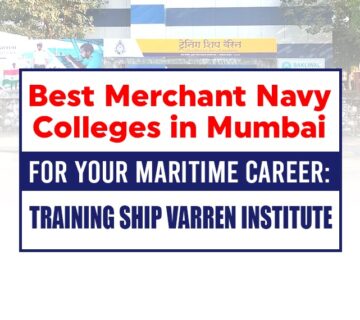Do you ever dream of a life where you can explore the vast ocean and see the world’s wonders? If so, the Merchant Navy is calling out to you with open arms. It’s not just a regular job; it’s a new way of living that embraces different cultures, pushes you to do your best, and lets you follow your passions. In this blog, we’ll guide you on this exciting journey, showing you the many opportunities after the Merchant Navy Course waiting for you in the Merchant Navy.
Understanding the Merchant Navy
The Merchant Navy plays a vital role in international trade and commerce. Unlike the Navy, which is responsible for defense and military operations, the Merchant Navy focuses on transporting goods, cargo, and passengers across the globe. Let’s dive into the fundamental aspects of this maritime industry:
The Merchant Navy is the backbone of global trade, facilitating the movement of goods between countries and continents. Vessels operated by the Merchant Navy transport a wide range of cargoes, including raw materials, machinery, automobiles, consumer goods, and energy resources, ensuring a seamless flow of goods across international waters.
Key Roles and Responsibilities
A well-structured hierarchy governs the operation of a ship in the Merchant Navy. The primary roles on the board include:
Deck Officers: Deck Officers are the heart and soul of a ship’s navigation team. They are responsible for charting the ship’s course, ensuring it stays on the right path, and safely reaching its destination. With a keen eye on weather conditions, nautical charts, and electronic systems, these officers make critical decisions to avoid obstacles and potential hazards in the open sea. Additionally, they oversee cargo operations, ensuring that the loading and unloading processes are carried out efficiently and by international regulations. You can apply for the position after completing the Merchant Navy Course.
Marine Engineers: Marine Engineers are engineering wizards who keep the ship’s machinery and engines running smoothly. They are experts in maintaining and repairing all the mechanical systems on board, such as propulsion engines, electrical generators, pumps, and cooling systems. Their technical expertise ensures the ship’s engines operate at peak performance, maximize fuel efficiency, and reduce environmental impact. Marine Engineers work tirelessly to keep the vessel’s essential systems in top-notch condition, ensuring a safe and reliable voyage.
Electro-Technical Officers: In this modern era, ships have advanced communication and navigation systems. Electro-Technical Officers (ETOs) take charge of these cutting-edge technologies, overseeing and troubleshooting the ship’s electronic and electrical systems. From communication equipment like radios and satellite systems to complex navigation tools like GPS and radars, ETOs ensure that these critical systems remain operational throughout the journey. Moreover, they are responsible for maintaining automation and control systems, making the ship’s operations more efficient and reducing the workload on the crew. The candidate must pass the Merchant Navy exam for this position.
Ratings and Support Staff: The diverse workforce of Ratings and Support Staff plays a crucial role in various shipboard operations. These professionals handle a wide range of tasks to ensure the smooth functioning of the vessel. They cater to the crew and passengers’ needs, providing essential services such as cooking delicious meals, maintaining a clean and comfortable living environment, and handling cargo loading and unloading operations. Without their dedicated efforts, the day-to-day functioning of the ship would not be possible.
Together, these skilled individuals form a cohesive team that collaborates harmoniously to make every maritime journey successful. Each department complements the other, creating a safe, efficient, and well-maintained vessel that conquers the waves and connects the world through the vast oceans. The dedication and expertise of these professionals form the backbone of the Merchant Navy, upholding its legacy of maritime excellence.
Advantages of a Career in the Merchant Navy
A career in the Merchant Navy offers several appealing advantages:
- Global Exposure: Sailors get the opportunity to explore diverse cultures and visit fascinating destinations worldwide once they have completed their Merchant Navy course.
- Lucrative Remuneration: Success in the Merchant Navy exam offers competitive salaries and tax benefits, providing financial stability and rewarding hard work.
- Professional Growth: With ample opportunities for career progression, individuals can rise through the ranks and assume more significant responsibilities.
- Lifelong Learning: Continuous training and development programs ensure that sailors stay updated with the latest advancements in the maritime industry.
Eligibility Criteria for Joining the Merchant Navy
Embarking on a career in the Merchant Navy requires meeting specific eligibility criteria, which vary depending on the position and the country’s regulations. In India, the following are the general requirements to set sail on this maritime adventure:
Educational Qualifications: Candidates should have completed their 10+2 education focusing on Physics, Mathematics, or Chemistry, securing a minimum of 60% marks. Alternatively, those who have completed their Class 10 with a minimum of 40% marks can also pursue a career in the merchant navy. Proficiency in English is essential, and candidates must score at least 50% marks in English.
Marital Status: At the time of joining, candidates should be unmarried. This requirement applies to both male and female candidates.
Medical Standards: The eyesight of candidates pursuing a B.Sc. (Maritime Science, etc.) should be 6/6 for each eye. For those pursuing B.Tech in Marine Engineering, the unaided eyesight can be plus or minus 2.5. The minimum acceptable vision is 6/12 in both eyes or 6/9 in the good eye and 6/12 in the other eye. Color blindness is not accepted in the merchant navy.
Age Limit: Candidates should be at least 17 years old when joining, and applications are typically accepted up to 22 years of age.
Physical Fitness: Good physical fitness is crucial for entering the merchant navy. Candidates must meet the medical fitness standards set by the authorities.
Final Words
Making a career in the Merchant Navy is challenging, but with the right strategy and hard work, you can achieve your desired path. Training Ship Varren can help if you want to go into a vast ocean field. With us, you can get Merchant Navy courses that help you attain your dream. Contact us for more detail.





